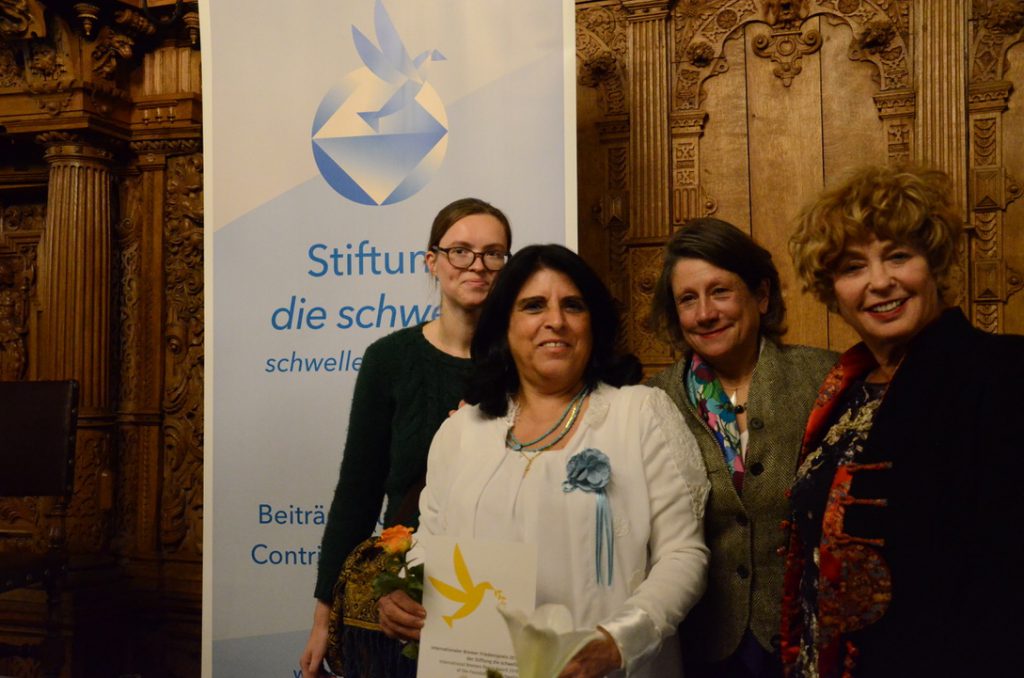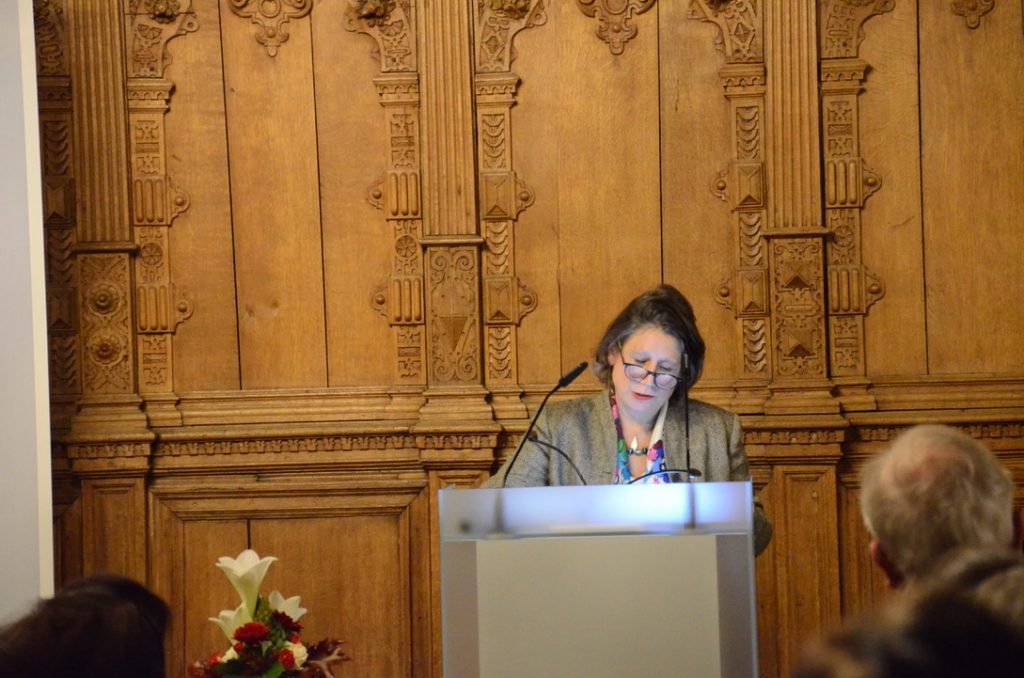
Women Wage Peace
International Bremen Peace Prize 2019, Foundation die schwelle
Bremen City Hall, 15 November 2019
International Bremen Peace Prize 2019, Foundation die schwelle
Laudatory Speech Women Wage Peace
Bremen city hall, 15 November 2019
Alexandra Senfft
Shalom, dear Eti, Salamat, dear Jullet!
I am very happy that both of you are here today on behalf of Women Wage Peace to receive the Peace Award 2109 given by the schwelle Foundation and to present your movement here in Bremen.
Dear audience,
I invite you to make the acquaintance of two courageous and unusual women: Eti Livni, a Jewish Israeli woman from Tel Aviv, lawyer, former Knesset member – and Julliet Kahwaji, a Palestinian Israeli woman from Akko, Arabic teacher, educationalist. Despite their many differences, they also have a lot in common: Both are mediators, women activists and each of them is the mother of three children. However, the strongest bond between them is their pursuit for peace in the Middle East as members of Women Wage Peace.
“Women Wage Peace” is the literal translation and it is clearly the antonym to “men wage war”. WWP is a grass roots movement which has grown quickly since 2014 and has meanwhile been joined by almost 50.000 people. WWPs fellow campaigners do indeed act politically but deliberately non-partisan, far removed from categories such as left, middle or right. They campaign across all borders: confessional, ethnic, political, ideological or cultural, independent of origin, sexual orientation, educational background or social position. They tirelessly advocate for peace negotiations between Palestinians and Israelis to be recommenced – and that, according to the UNO Resolution 1325, women should be included in the negotiations. They demand that diplomatic options should always be used to their full potential before turning to the almost automatic option of war – and they have introduced a respective bill in the Knesset. In order to soften the hardened frontiers and appeal to the largest possible number of women from all backgrounds, WWP consciously do not take an explicit standpoint. Neither do they give exact formulations as to HOW a political solution should look. They only demand THAT there must be a solution: “It is our strength to remain vague”, as one activist puts it.
As I speak from a completely different perspective, through my choice of words and my evaluations, I allow myself to adopt a specific standpoint although I know that some women in WWP would not share my position. However, the ability to be impartial and vague is not the only strength that WWP possesses: they also have the ability to tolerate different points of view.
It should, however, be clear to all of us sitting here in the town hall of Bremen that our empathy – in particular as Germans against the backdrop of the crimes committed by the Nazis and their consequences up until the present day – that we have a responsibility to support both Israelis and Palestinians at the same time and to the same extent. Whoever adopts a one-sided position and only campaigns for one side of the conflict contributes to the propagation of the concept of the enemy and to hatred. Promoting peace means supporting every single person who wants peace and is prepared to work for it constructively, even if it means doing so against one´s own personal inner resistance. This explains precisely the reason for the award given here this evening.
To explain the context, I’d like to expand on this a little: “Shalom Achshav”, Peace Now is the name of the peace movement which founded itself in 1978 when Egypt and Israel made peace – a cold peace, which prevails until today. However, peace refuses to come to Israelis and Palestinians. Not much is now still heard of the once broad movement “Shalom Achshav”, and it has also become quiet regarding other non-governmental organisations.
After the First Intifada, the Palestinian uprising against the Israeli occupation, and the Gulf War in 1991, the Oslo Treaties were signed in 1993. The implementation of these agreements was, however, accompanied by the continued construction of Israeli settlements on occupied Palestinian territory and by terrorist attacks carried out by Palestinian extremists against Israeli civilians.
The first tender shoots of trust were quickly trampled into the ground.
“We must fight terrorism as if there’s no peace process, and work to achieve peace as if there’s no terror.”, Prime Minister Yitzhak Rabin stated. He was convinced that Israelis and Palestinians should be physically separated. For this reason, the number of Palestinian day labourers in Israel was drastically restricted and the so-called safety fence built, which monstrously meanders through the beautiful landscape and cuts straight through residential areas. The wall led to further estrangement: Failing daily human contact, the neighbour on the other side of the barrier became increasingly the enemy, or more specifically the image of the enemy. For “not knowing” breeds uncertainty and fear, and thus gives rise to or strengthens prejudices and clichés.
On the 4th November 1995, exactly 24 years ago, Yitzhak Rabin was murdered by an Israeli extremist. This marked the beginning of the end of any rapprochement. To the same degree that the people were separated by administration zones, fences, safety roads and military checkpoints, suspicions grew, reservations, resignation and apathy. The breakdown of the Camp David negotiations in 2000, to which all parties had contributed, led to a further negative turning point. Israeli Prime Minister Ehud Barak blamed the Palestinians alone for the failure and he formed the phrasethat there is no Palestinian partner with whom to negotiate. Propagated by the media and politicians, this myth prevailed, and further negotiations came to nothing.
In fact, the failed Oslo process had devalued the word peace to such an extent that only very few people still wanted to use it seriously. Since then, there has been a status quo of a largely controlled lack of peace between Israel and the West Bank. The contact between Palestinians and Israelis visible for us reveals itself in the skirmishes and devastating wars fought 2008/2009 and 2012 and 2014 between the Islamistic Hamas in the Gaza Strip and the Israeli army. As we witness again, unfortunately, today. The victims are largely civilians, mostly women and children.
The Gaza War in 2014, which left 2000 Palestinians and 73 Israelis dead, was the last straw for many frightened, concerned and outraged women. Enough is enough! Dozens of peace activists set off as the initiators of Women Wage Peace to make the word peace once again the subject of the public discourse. They no longer want to send their children to war but want to secure them a safe future. Security, they say, does not result from fences, walls and weapons but through education, justice and the empowerment of women who contribute to peace–at the grass roots level and at the negotiation table. And through trust.
In the first year, the women organised the peace train, a train journey through Israel in which 1000 women participated. In 2015 they went in shifts on hunger strike for 50 days by temperatures of 40 degrees centigrade, during which time they discussed with sympathisers and opponents. In 2016 on the “March of Hope” they walked for two weeks across Israel. 30.000 women and men, Israelis, Palestinians and Arabs, all took part. In 2017 they once again motivated thousands for their “Journey to Peace” and hiked from the North to the South. In 2018 they pitched the “Mothers´ tent” opposite the Knesset and introduced the bill “Political Alternatives First” in the Knesset in order to make diplomatic efforts the first alternative to war.
The activists frequently demonstrate in front of the Knesset, organised in a decentralised and non-hierarchical way, and they conduct workshops, give lectures, organise events. Their activities are often accompanied by joint singing sessions, united in the power of music. One of the highlights was when the Israeli singer Yael Deckelbaum and the Palestinian musician Meera Eilabouni sang together Leonard Cohen´s “Hallelujah” in both Hebrew and Arabic. Deckelbaum´s “Mothers` Prayer”, which she wrote for a the “March of Hope” in 2016, has since inspired many peace activists around the world.
The women from WWP turn their pain, their trauma and fears into constructive action. They make space for their conflicting narratives through “radical listening” and give each other the opportunity to show themselves without delegitimising the narrative of the other. They do not fall into the usual destructive pattern of comparing which side has suffered more, who is the victim and who the perpetrator. They avoid shaming and blaming as this would only stand in the way of any form of dialogue.
The women of WWP refuse to continue to see themselves as victims and instead take responsibility. “We are not the leaf in the wind, we are the tree”, as one activist puts it. They overcome their own personal loneliness by coming together in solidarity to struggle for something instead of fighting against each another. From their perspective there most certainly are negotiation partners. “True peace means that you recognize how the other is different from you, not how the other is the same as you are”, said the pioneer for Dialogue in Conflict Situations, Dan Bar-On.
It is admittedly a question of overcoming personal inner barriers, many resistances and also hostile external factors while always being acutely aware of the asymmetrical situation between Palestinians and Israelis. That leads to tensions, and it is a great challenge for both sides to take part in a “dialogue under fire” as Bar-On called it. For many women, their commitment means taking great risks in an atmosphere of boycott, anti-boycott boycott, of hatred, prejudice and in an environment that easily resorts to violence, sometimes even in their own homes. Under Prime Minister Bibi Netanjahu, his right-wing and national-religious coalition partners, the mood within the country has become increasingly polarised.
A policy of division reigns.
Peace activists, civil-society initiatives and NGOs are denigrated and marginalised. Through the Nation State Law, introduced in 2018, which stipulates that the right to exercise self-determination is unique to the Jewish people”, 20 percent of the Arabic and Palestinian population of Israel have been officially reduced to second-class citizens. And which party apart from the “United List” still speaks today of peace and calls for negotiations? Peace negotiations are no longer on top of the international agenda in a world which is becoming increasingly polarised. And very few people actually expect a solution from the repeatedly deferred US peace plan of the Trump administration – if such a plan should ever be presented at all.
All the more important is the message of love, hope and peace sent out by WWP to positively influence the atmosphere and the discourse. Unite, not divide, is their motto. But that takes time. And there is a way.
Dear Jullet and Eti, may this prize, which you receive in the name of WWP, encourage you to continue: grittily, undeterred, stubbornly, self-determined, womanly, prudently and creative. Even if the seeds have not yet sprouted, still they have been sown. The day will come when all your efforts from the bottom, from the grassroots, will receive their true response from the top, through politics.
“If we abandon hope, then that what we most fear will most certainly come to pass”, said the German philosopher Ernst Bloch. May the Principle of Hope lead you on and inspire you. We want to accompany you emphatically along this path. Be´ahava, bil-Hub. With love.
Many thanks, shukran jazilan, toda raba, vielen Dank.

